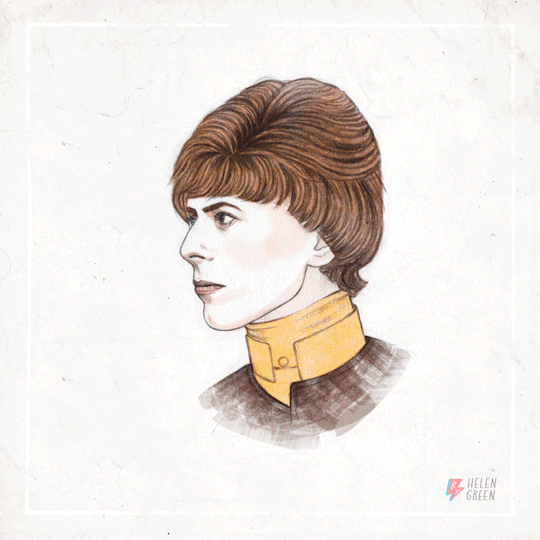What We Can Learn From How David Bowie Coped With Terminal Illness

The singer and actor knew his diagnosis was terminal. (Gif: Helen Green)
David Bowie received a terminal cancer diagnosis more than 18 months before he died, but reportedly kept it hidden from many, including some close friends.
The 69-year-old music icon suffered from liver cancer, Ivo van Hove, the director of a musical based on Bowie’s songs, told Dutch radio station NOS.nl. “He told me more than one year and three months ago that he had liver cancer, just after he had been told himself,” van Hove said, per the U.K.’s Daily Mail. “He said that because he knew that he may not always be able to be around.”
Bowie reportedly wrote thank you notes to friends before his death, who weren’t aware of his diagnosis until Monday’s announcement of his death. He also released his final album Blackstar on Jan. 8, as well as a video for the song Lazarus, which begins with the lyrics, “Look up here, I’m in heaven.”
Tony Visconti, a producer who worked on Blackstar, said in a Facebook post that the album was deliberately created as a “parting gift” for Bowie’s fans. “He always did what he wanted to do,” Visconti said. “And he wanted to do it his way and he wanted to do it the best way.“
Related: Here Are the New Breast Cancer Screening Guidelines
Unfortunately, liver cancer rates are growing in the U.S., the American Cancer Society reports, and it often affects men more than women. According to Society estimates, more than 35,000 news cases were diagnosed in 2015, and more than 24,500 people died of the disease last year.
“It almost always is terminal,” Lewis Roberts, MD, a gastrointestinal cancer expert at Mayo Clinic, tells Yahoo Health. Liver cancer can be treated if it’s caught early, Roberts says, but in most industrialized countries like the U.S., only 15 to 20 percent of liver cancer patients are still alive five years after their diagnosis.
Related: How David Bowie Helped Us Learn To Treasure Difference
People who are diagnosed early enough can be treated with a liver transplant, surgery, or a procedure in which a needle-like probe is inserted into the liver, which “cooks” the area around the cancer. “Those treatments can be extremely successful,” says Roberts.
Liver cancer can be caused by hepatitis, alcohol, or fatty liver disease, Roberts says, the latter of which is tied to obesity, which may explain the growing incidence of the disease in the U.S.
But Jack Jacoub, MD, an oncologist at California’s Orange Coast Memorial Medical Center tells Yahoo Health that liver cancer “only develops in individuals who have a diseased liver.” If a liver disease is caught, patients must have regular liver cancer screenings to try to catch liver cancer at an early point. “You don’t want to come in with advanced liver cancer,” Jacoub says. “That’s a situation where the prognosis is not good.”
Unfortunately, Roberts and other clinicians like him have to give terminal diagnoses, which he calls “challenging.”
Related: This Ovarian Cancer Screening Test Could Save Lives
“It’s very stressful for people to hear about having a diagnosis like that, especially if it’s an advanced diagnosis where a lot can’t be done,” Roberts says.
Not everyone turns their grief into art, like Bowie. Some patients may become depressed by the news and will be referred to a psychologist or psychiatrist who can help them come to terms with the diagnosis. They also can receive support from terminal care and hospice programs, Roberts says.
There are several stages that a person goes through once they’re diagnosed with a terminal illness, Joseph Nowinski, PhD, co-author of Saying Goodbye: A Guide to Coping with a Loved One’s Terminal Illness, tells Yahoo Health.
“The first thing that happens is a state of crisis for the individual and loved ones,” he says. “There’s a lot of anxiety, needless to say, and sometimes panic.”
The second stage involves loved ones pulling together after getting through the shock to help comfort each other, figure out next steps, and what needs to be done. This is typically when someone would make a will, if they haven’t already, and try to figure out what they can do to take care of their loved ones, says Nowinski.
The third stage is the final and most difficult one. “This is where it begins to wear on the terminally ill person and their loved ones,” Nowinski says. “The strain begins to show as time wears on.” During this time, Nowinski says it’s incredibly important to support a terminally ill patient, emotionally and physically.
It’s also often during this time that people think about their legacy, he notes, and often work to be remembered in a certain way.
There are some treatment options available to people with a terminal diagnosis but it depends on how advanced their cancer is. Some may extend a person’s life by several months, but others may make things worse if the cancer is advanced. “Most drugs or chemotherapies have to be processed by the liver,” Roberts says. “For people with very advanced liver disease, there is nothing we can recommend.”
While Roberts stresses the importance of early detection, he also wants people to know about the severity of liver cancer: “This is one of the fastest growing cancers in the U.S. It’s important for people to be aware.”
Let’s keep in touch! Follow Yahoo Health on Facebook, Twitter, Instagram, and Pinterest.

